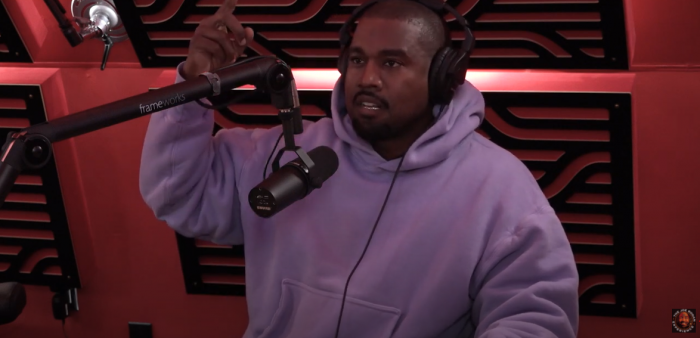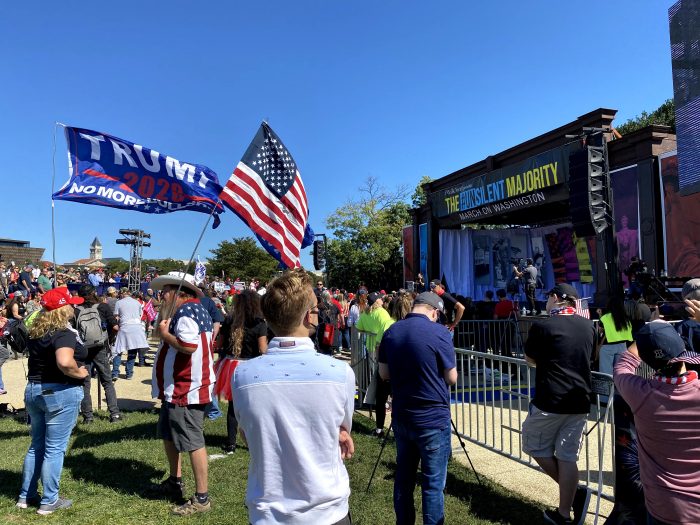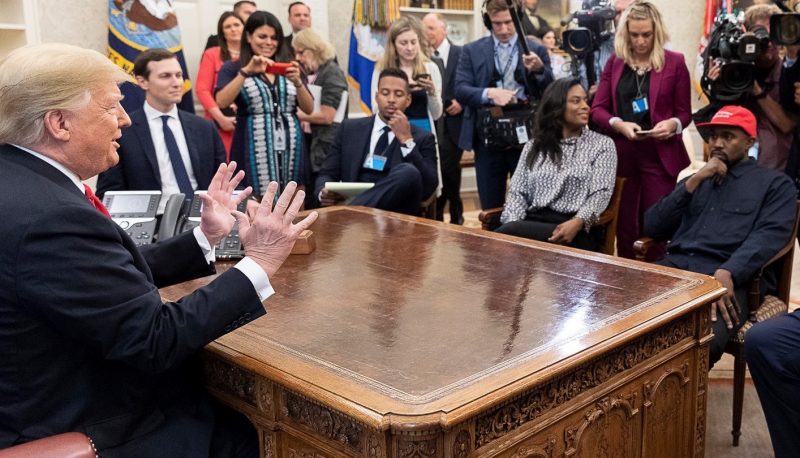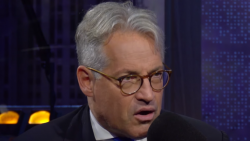In the final days before the 2016 election, Bloomberg Businessweek published a report about how the campaign to elect Donald Trump had given up courting the Black vote and decided instead to simply suppress it. “We have three major voter suppression operations under way,” a senior official in the Trump campaign told Bloomberg Businessweek. Most notably among the groups targeted were African Americans voters.
In 2020, the Trump campaign is bringing out the old playbook, determined to suppress the Black vote by recreating the environment of 2016. While 2020—with a pandemic and accompanying economic downturn that overwhelmingly affects Black and brown communities, mass anti-racism protests, an opponent who served as vice president to the first Black president, and a Black vice presidential candidate on the ticket—is no 2016, the tactics, at first glance, appear to be much the same though improved upon from 2016. Key to the Trump campaign’s success in depressing turnout among Black voters who would otherwise be reliable Democratic voters was a third-party presidential candidate who syphoned off votes from Clinton and a disinformation campaign meant to disillusion Black voters, making the case that Clinton was no less racist than Trump and that participation in politics has not helped Black Americans.
Despite only receiving only 6 percent of the Black vote, Trump’s 2016 campaign to depress the Black vote was successful. Black turnout fell for the first time in two decades in 2016. Essential to Trump’s win were three states: Michigan, Wisconsin, and Pennsylvania, where he took in roughly 70,000 more votes than Clinton. In Detroit, Michigan, where 79 percent of residents are Black, a curious thing happened: 90,000 Americans headed to the polls but left the top presidential ticket blank.
What Happened in 2016?
In 2016, the Trump campaign got their hands on a large cache of data on nearly 200 million voters put together from the now defunct Cambridge Analytica. The U.K.’s Channel 4 News investigation, published in September, revealed how the campaign used the data, which included everything from street address and occupation to likely personality type, to divide voters into different categories based on how they were likely to vote. African American voters were disproportionately included in the “Deterrence” category—marked as voters the Trump campaign didn’t want heading to the polls.
With the help of a Facebook employee embedded in the Trump campaign, the campaign pumped out thousands of ads and social media posts targeting these individuals, creating a narrative that “they’re both the same,” says Shireen Mitchell, a digital data analyst focusing on disinformation. Why bother voting for Hillary Clinton when she’s no better than Donald Trump? Other ads encouraged voters to cast their ballot for Green Party candidate Jill Stein.
They weren’t the only ones. A report by the Senate Intelligence Committee found that a Russian fake-news campaign targeted “no single group … more than African-Americans,” using thousands of fake Twitter, Facebook, Instagram, and YouTube accounts with the goal of getting Trump elected.

Third Party Candidate
In July, former Clinton-supporter Chance the Rapper took to Twitter to voice his support for Kanye West’s presidential bid and his skepticism of Biden.
“And yall out here tryna convince me to vote for biden,” Chance said in a retweet of Kanye.
“Are u more pro biden or anti ye and why?” Chance asked his 8 million followers, referring to his friend West by his nickname Ye. “I get that you’ll want to reply that you’re just tryna ‘get trump out’ but in this hypothetical scenario where you’re replacing Trump, can someone explain why Joe Biden would be better??”
West, a Grammy-winning rapper, producer, and former MAGA-hat wearing Trump supporter, announced his run for the presidency in July, poured nearly $12 million into his presidential campaign, and hired top political consultants. At his one campaign stop, West, who announced in 2018 that he is bipolar, broke down in tears on stage. He’s pushed GOP talking points himself, advocated for bringing God back into the discussion, and has acknowledged that his presidential bid could pull voters away from Biden, adding, “To say that the Black vote is Democratic is a form of racism and white supremacy.”
Though West is not considered a serious candidate for president—some have said it’s a publicity stunt for his latest album, while others have suggested it’s a practice run for 2024—one thing is clear: Republican right-wing operatives want him on the ballot.
At least six Republican operatives, some tied to the Trump campaign, have tried to get West on the ballot in key states in an apparent effort to pull votes away from Biden. One of the operatives, Mark Jacoby, was arrested on voter fraud charges for using a childhood address to gather signatures for the California Republican Party in 2008 and was accused of tricking people to signing up to register as Republicans, according to ABC News. In Wisconsin, a GOP operative who has worked for the Wisconsin Republican Party, Republican National Committee, and Trump campaign, dropped off the required signatures to put West’s name on the ballot, while in Arkansas, another GOP operative with West’s campaign previously served as the executive director of Ralph Reed’s Faith and Freedom Coalition and of the American Conservative Union, which puts on the biggest annual gathering of conservatives in the country.
“It is clear that Republicans and Trump think they will benefit from having Kanye West on the ballot,” Justin Myers, CEO of the union-funded super PAC For Our Future, told Politico.
“They’re trying to get Kanye West onto key states that they think they can win in,” Mitchell said, “to recreate the exact same environment that they had in 2016. And they really don’t have a third party candidate at this moment to stave off any potential votes from the Democratic Party. So they’re trying to create that environment with Kanye West.”
Even just a small number of voters voting third party can be consequential in tight races. Stein won just 1 percent of the vote nationally, but had those voters, who would appear to lean progressive, voted for Clinton in just three states—Michigan, Wisconsin, and Pennsylvania—Clinton would have won the presidency.
While it would be beneficial to Trump’s campaign to syphon votes away from the Democratic nominee—who in recent history has won northward of 90 percent of the Black vote—the other part of the goal is simply to “get disaffected people not to bother,” Mitchell says.
That is what Russia did in 2016 with social media posts targeting Black voters with lines like, “A Vote for Jill Stein is Not a Wasted Vote,” “Our Votes Don’t Matter,” and “Don’t Vote for Hillary Clinton,” according to a Senate report on Russia’s meddling in U.S. elections.
West is polling around 2 percent nationally, according to an August Politico-Morning Consult poll, and is doing just as poorly among Black voters. While both Democratic and Republican strategists appear to believe West’s presidential bid will not have spoiler status, there are still those who will see his run as a vote worth casting. On Oct. 24, podcast host and former MMA star Joe Rogan, who recently hosted radical right-wing conspiracy theorist Alex Jones, had West on his show. The nearly three-hour interview has already amassed more than 10 million views on YouTube.
Chance, for his part, changed his tune by the end of the day after a deluge of criticism, deciding it wasn’t a hill he wanted to die on. “Ok sprinting down the hill now: I understand the improbability of Ye winning the 46th Presidential seat and I understand that everyone voting for Biden isn’t necessarily doing so enthusiastically,” he tweeted.
‘Both the Same’ Narrative
In May, Biden joined the hosts of the Breakfast Club, a popular Black radio show, to discuss his campaign. At the end of the interview came remarks Biden would later label as “much too cavalier.”
“If you have a problem figuring out whether you’re for me or Trump, then you ain’t Black,” Biden told co-host Charlamagne tha God.
Later that afternoon, the Trump campaign ran a Twitter ad highlighting the comments, and that evening, they began selling a “#YouAintBlack” T-shirt. The Trump campaign launched a $1 million digital ad campaign highlighting the comments as well as a website dedicated to them that labeled Biden racist. For the past week, “A set of 40 digital ads claiming ‘Joe Biden Insulted Millions of Black Americans’ has been running across the country,” The New York Times reported Saturday.
To Mitchell, it was just the latest example of the Trump campaign trying to paint Biden and Trump as “both the same,” a way to re-up their 2016 line of attack to discourage Black voters from heading to the polls. She took a moment to clarify how differently she sees the candidates: “One candidate is a fascist, and the other is a centrist, OK? But nothing about those two things are the same.”
“When they saw that, they saw that as an opportunity. They thought they could get another wedge into Black voters with that,” Mitchell said.
The ad blitz was reminiscent of other comments the 2016 presidential campaign took advantage of: comments from 1996 in which Hillary Clinton referred to African American youth in gangs as “superpredators.” These comments were pushed across social media and broadcasts in social media posts and videos 2016, airing on television 402 times in October of that year and receiving millions of views on Facebook, according to Channel 4. Channel 4 reporters found that the campaign spent $55,000 on such messages targeting Black voters in Georgia alone.
It’s hard to say just how successful the “predators ad” was at keeping voters home, but Black turnout fell for the first time in 20 years in 2016, and it’s clear Team Trump sees it as a successful strategy.
In recent weeks, Trump has falsely accused Biden of calling Black people “superpredators.” At the final presidential debate on Oct. 22, Trump was asked about the talk Black parents give their children about law enforcement; he took the question as an opportunity to launch his false attack on Biden. “[Biden has] been in government 47 years. He never did a thing. Except in 1994, when he did such harm to the Black community and they were called, and he called them ‘superpredators,’ and he said that, he said it, ‘superpredators,’” Trump said.
Biden has not said any such thing, but that hasn’t stopped Trump for repeating the lie.
Part of this strategy is to deflect from Trump’s long history of racism. In 1989, Trump called for the death penalty for five teenage boys wrongly convicted of attacking and raping a white woman in Central Park, taking out a full-page ad to call for their deaths. He has refused to apologize for the comments. In 2017, at the Unite the Right white supremacist gathering in which counterprotester Heather Heyer was murdered, Trump said there were “very fine people on both sides.” Just this summer, Trump attacked Black Lives Matter protesters and fear-mongered about anarchists from the protests destroying the suburbs. Meanwhile, Trump defended Kyle Rittenhouse, a white 17-year-old vigilante who shot three anti-racism protesters, killing two. At the first presidential debate he declined to disavow white supremacists and told the Proud Boys hate group to “Stand back, and stand by.”
Right-Wing Activists Push Voters to Leave Top of the Ticket Blank, Attack Kamala Harris
Right-wing political operatives have jumped onto other campaigns that push the narrative that Trump and Biden might as well be the same and that Harris isn’t really Black.
The controversial American Descendants of Slavery organization, frequently referred to as ADOS, has pushed for reparations for American descendants of slaves—but not other Black descendants of slaves even if they’re American citizens—and argued that Democrats take advantage of the Black vote.
The desire for reparations and a feeling of being taken for granted by the Democratic Party are not new in the Black community, but “it’s that kernel of truth that they use to weaponize the rest of it,” Mitchell said.
ADOS has encouraged African American voters to vote down ballot, with one supporter explaining just what they meant by that: to head to the polls and vote Democrat but to leave the top of the ticket blank. The logic behind that appears to be to show that the Black vote must be earned and, presumably, that nothing worse will come of one presidential candidate winning over another. It’s also what Russia and Team Trump encouraged Black voters to do in 2016.
Far-right commentator Ann Coulter has voiced her support for ADOS, retweeting the group and attacking Democratic vice presidential nominee Kamala Harris as not being American enough. (The group is also anti-immigrant, which may be where Coulter’s support began. Coulter, who is notoriously anti-immigrant, has argued that death squads may be necessary for people who refuse to stop immigration.)
Tariq: I like #ADOS, but I think it should be #DOAS – Descendants of American slaves. Not Haitian slaves, not Moroccan slaves, etc. https://t.co/Zo6f7vNmSH
— Ann Coulter (@AnnCoulter) February 7, 2019
I for one am not defining her "blackness." I'm defining her "Americanness."
All we talk about is slavery, and yet we're still waiting for a POTUS/VPOTUS candidate who a descendant of American slaves. https://t.co/l2vycNkPKN
— Ann Coulter (@AnnCoulter) August 12, 2020
While there are real people in the ADOS movement, fake accounts of people posing as Black Americans have also popped up to support ADOS messaging.
In 2016, Russia had thousands of fake accounts posing as Black Americans. Russian agents specifically “focused on developing black audiences and recruiting black Americans as assets,” according to a 2018 report commissioned by the Senate. And it appears Team Trump has learned from them.
Right-wing commentators have also tried to define Harris’ blackness. Since before Harris, who is the daughter of Jamaican and Indian immigrants, was determined the vice presidential candidate, these attacks began with what appears to be a coordinated effort, according to a report released by Stop Online Violence Against Women. Those attacks were renewed when she became Biden’s running mate.
“Kamala Harris is not an African-American. She is Indian and Jamaican. Jamaica is part of the Caribbean. India is out there near China,” right-wing commentator Mark Levin said. “I only point that out because if you dare raise that you’re attacked. But the truth is, she’s not.”
Dinesh D’Souza accused Harris of being related to a white slaveowner—as many descendants of enslaved people are due to the horrors many women who were enslaved faced—and suggested, strangely, that he supports reparations but that Harris doesn’t deserve reparations.
“I’m not saying Kamala Harris is to blame for her slaveowner heritage. But by the same logic whites descended from slaveowners aren’t to blame either. So why are we talking about reparations?” D’Souza said. “If whites enjoy the present effects of past exploitation, so does Harris. Make her pay!”

Right-wing groups have also tried to make smaller groups that claim to be made up of voters of color leaving the Democratic Party, including Blexit and the Walk Away Campaign, appear more influential than they actually are.
Blexit advocates for Black Americans to leave the Democratic Party. The campaign is led by right-wing provocateur Candace Owens, who resigned from Turning Point USA after she suggested that the only problem with Adolf Hitler was that he took his ambitions outside Germany. Owens has also called George Floyd, who died at the knee of a white police officer, a “horrible human being.”
In October, Trump gave his first speech at the White House since his COVID-19 diagnosis. Footage of the event showed a crowd full of MAGA-hat wearing Black Trump supporters. After the event, ABC News reported that Blexit paid for the travel and lodging of these supporters who they required to wear a “Blexit” T-shirt; it is still unclear who is funding Blexit.
There are, of course, Black conservatives who will decide to vote for Trump because they believe he is the best candidate on the ticket. Mother Jones recently published a deep dive on Black Trump supporters and the long history of Black conservatism that doesn’t fit neatly into the two-party system. But the numbers still don’t suggest a Black exit from the Democratic Party.
While Trump has gained some ground among African American men, Black voters are still overwhelmingly in support of Biden, which is why, though the Trump campaign has made some overtures to Black voters with criminal justice reform, it has also renewed its line of attacks to keep disaffected Black voters at home.
“And there’s so many Black people that say that their votes don’t matter,” Mitchell said. “It’s like if their votes didn’t matter, why is everybody, foreign and domestic, coming for your vote?”








